- Home
- Hunter S. Thompson
The Rum Diary Page 17
The Rum Diary Read online
Page 17
I was tempted to tell them about Chenault, giving them all the details and finishing up with a hideous vision of where she was now, and what she was doing. Instead, I sat quietly and stared down at the white clouds. I felt like I'd survived a long and perilous binge, and now I was going home.
My car was in the airport lot where I'd left it, and Yeamon's scooter was chained to a railing by the attendant's shack. He unlocked it and said he was going on out to his house, despite my advice that he stay at my place so he could pick her up if she came in sometime during the night.
“Hell,” I said. “She might already be back for that matter. For all we know, she thought we abandoned her last night, so she went to the airport.”
“Yeah,” he said, jerking the scooter off its stand. “That must be what happened, Kemp. Maybe she'll have dinner ready when I get back to the house.”
I followed him out the long driveway and waved goodbye as I turned off on the highway toward San Juan. When I got back to the apartment I went to sleep immediately and didn't wake up until noon the next day.
On my way down to the office I wondered if I should say anything about Chenault, but the moment I walked into the newsroom I forgot all about her. Sala called me over to his desk, where he was talking excitedly with Schwartz and Moberg. “It's all over,” he yelled. “You should have stayed in St Thomas.” Segarra had quit and Lotterman had left the night before for Miami, presumably in a last-ditch effort to get new financing. Sala was convinced the paper was going under, but Moberg thought it was a false alarm. “Lotterman has plenty,” he assured us. “He went to see his daughter -- he told me right before he left.”
Sala laughed bitterly. “Wake up, Moberg -- do you think Greasy Nick would have dumped a soft job like this if he didn't have to? Face it, we're unemployed.”
“Goddamnit,” Schwartz exclaimed. “I was just getting settled here -- this is the first job I've had in ten years that I wanted to keep.” Schwartz was about forty and although I didn't see much of him except at work, I liked him. He did a good job on the desk, never bothered anybody, and spent his free time drinking in the most expensive bars he could find. He hated Al's, he said; it was too clubby, and dirty besides. He liked the Marlin Club and the Caribe Lounge and the other hotel bars where a man could wear a tie and drink in peace and occasionally see a good floor show. He worked hard, and when he finished working he drank. After that he slept, and then he went back to work. Journalism to Schwartz was a jigsaw puzzle a simple process of putting a paper together so that everything fit. Nothing more. He considered it an honorable trade and he'd learned it well; he had it down to a formula and he was damn well going to keep it that way. Nothing annoyed him more than a screwball or a crank. They made his life difficult and caused him to brood endlessly.
Sala grinned at him. “Don't worry, Schwartz -- you'll get a pension -- probably forty acres and a mule, too.”
I remembered Schwartz's first appearance at the News. He wandered into the newsroom and asked for a job the same way he'd walk into a barbershop and ask for a haircut, and with no more idea of being turned down. Now, if there was another English-language paper in town, the collapse of the News would mean no more to Schwartz than the death of his favorite barber. It wasn't the loss of a job that upset him, but the fact that his pattern was being threatened. If the paper folded, he'd be forced into some strange and irregular action. And Schwartz was not that way. He was perfectly capable of doing a strange and irregular thing, but only if he'd planned it Anything done on the spur of the moment was not only stupid, but immoral. Like going to the Caribe without a tie. He viewed Moberg's way of life as a criminal shame and called him “that job-hopping degenerate.” I knew it was Schwartz who had put into Lotterman's head the idea that Moberg was a thief.
Sala looked up at me. “Schwartz is afraid they'll cut off his credit at the Marlin and he'll lose that special seat at the end of the bar -- the one they save for the dean of the white journalists.”
Schwartz shook his head sadly. “You cynical fool. We'll see how you feel when you start looking for a job.”
Sala got up and started for the darkroom. “No more jobs in this place,” he said. “When Greasy Nick jumps ship, you can bet the word is out.”
A few hours later we went across the street for a drink. I told Sala about Chenault and he twisted nervously in his seat as I talked.
“Man, that's awful!” he exclaimed when I finished. “Christ, it makes me sick!” He whacked the table with his fist. “Goddamnit, I knew something like that would happen -- didn't I tell you?”
I nodded, staring down at my ice.
“Why the hell didn't you do something?” he demanded. “Yeamon's pretty good at slapping people around -- where was he all that time?”
“It happened too fast,” I said. “He tried to stop it, but they stomped him.”
He thought for a moment. “Why did you take her to that place?”
“Come on,” I said. “I didn't go over there to play chaperon to some lunatic girl.” I looked across the table at him. “Why didn't you stay home and read a good book the night you got whipped by the cops?”
He shook his head and fell back in the booth. After two or three minutes of silence, he looked up. “What the hell are we heading for, Kemp? I'm really beginning to think we're all doomed.” He scratched his face nervously and lowered his voice. “I'm serious,” he said. “We keep getting drunk and these terrible things keep happening and each one is worse than the last. . .” He waved his hand in a gesture of hopelessness. “Hell, it's no fun anymore -- our luck's all running out at the same time.”
When we got back to the office I thought about what he'd said, and I began to think that Sala might be right. He talked about luck and fate and numbers coming up, yet he never ventured a nickel at the casinos because he knew the house had all the percentages. And beneath his pessimism, his bleak conviction that all the machinery was rigged against him, at the bottom of his soul was a faith that he was going to outwit it, that by carefully watching the signs he was going to know when to dodge and be spared. It was fatalism with a loophole, and all you had to do to make it work was never miss a sign. Survival by coordination, as it were. The race is not to the swift, nor the battle to the strong, but to those who can see it coming and jump aside. Like a frog evading a shillelagh in a midnight marsh.
So, with this theory firmly in mind, I went to see Sanderson that night, meaning to leap from the bog of threatened unemployment to the high-dry branch of fat assignments. It was the only branch I could see within a thousand miles, and if I missed it, it meant a long haul to a new foothold, and I didn't have the faintest idea where it would be.
He greeted me with a fifty-dollar check, which I saw as a good omen. “For that article,” he explained. “Come on out to the porch, we'll get you a drink.”
“Drink, hell,” I said. “I'm looking for unemployment insurance.”
He laughed. “I might have known -- especially after today.”
We stopped in the kitchen to get some ice. “Of course you knew Segarra was going to quit,” I said.
“Of course,” he replied.
“Jesus,” I muttered. “Tell me, Hal -- just what does the future hold for me? Am I going to get rich, or go to the dogs?”
He laughed and started for the porch, where I could hear other voices. “Don't worry,” he said over his shoulder. “Come on out where it's cool.”
I didn't feel like dealing with a bunch of new people, but I went out to the porch anyway. They were young and they had all just come from somewhere exciting, and they were very very interested in Puerto Rico and all its possibilities. I felt successful and au courant. After days of being blown and buffeted in the rotten winds of life, it was nice to be back on the inside.
The Rum Diary
Seventeen
I was awakened the next morning by a tapping on my door, a soft, yet urgent tapping. Don't answer it, I thought, don't let it happen. I sat up in bed and stared at the door for a minute. I g
roaned, putting my head down in my hands and wanting to be anywhere in the world but here and involved in this thing; then I got up and walked slowly over to the door.
She was wearing the same clothes, but now she looked haggard and dirty. The delicate illusions that get us through life can only stand so much strain -- and now, looking at Chenault, I wanted to slam the door and go back to bed.
“Good morning,” I said.
She said nothing.
“Come in,” I said finally, stepping back to clear the doorway.
She kept staring at me with an expression that made me more nervous than ever. It was humiliation and shock, I suppose, but there was something else in it -- a shade of sadness and amusement that was almost a smile.
It was a frightening thing to see, and the longer I looked at it the more convinced I was that she'd lost her mind. Then she walked in and put her straw pocketbook on the kitchen table. “This is nice,” she said in a quiet voice, looking around the apartment.
“Yeah,” I said. “It's okay.”
“I didn't know where you lived,” she said. “I had to call the newspaper.”
“How did you get here?” I asked.
“A cab.” She nodded toward the door. “He's waiting outside. I don't have any money.”
“Jesus,” I said. “Well, I'll go out and pay him -- how much is it?”
She shook her head. “I don't know.”
I found my wallet and started for the door. Then I realized I was wearing nothing but shorts. I went back to the closet and pulled on my pants, half desperate to get out of the place and organize my thoughts. “Don't worry,” I said. “I'll get it.”
“I know,” she said wearily. “Could I lie down?”
“Sure,” I said quickly, hopping over to the bed. “Here, I'll straighten it out for you -- it's one of those beds that turns into a couch.” I pulled up the sheets and tucked the spread around them, snatching at the wrinkles like a charwoman.
She sat down on the bed, looking at me as I pulled on a shirt. “This is a wonderful apartment,” she said. “So much sun.”
“Yeah,” I replied as I moved toward the door. “Well, I'll pay the cab now -- see you in a minute.” Then I ran down the steps to the street. He smiled happily as I came toward him. “How much is it?” I said, opening my wallet.
He nodded eagerly. “Si, bueno. Senorita say you pay. Bueno, gracias. Senorita is not okay.” He pointed meaningfully at his head.
“That's right,” I said. “Cuanto es?”
“Ah, si,” he replied, holding up seven fingers. “Seven dolares, si.”
“Are you nuts!” I said.
“Si,” he said quickly. “We go all over, around and around, stop here, stop there. . .” He shook his head again. “Ah, si, two hours, loco, senorita say you pay.”
I gave him seven dollars, assuming he was lying, but believing him when he said the morning had been loco. No doubt it had been, and now it was my turn. I watched him drive off, then I went over to a spot under the flamboyan tree, out of sight of the windows. What the hell am I going to do with her? I thought I was barefoot and the sand was cool under my feet I looked up at the tree, then over to the window of my apartment. She was in there, already on the bed. Here the News was about to fold and suddenly I had a penniless girl on my hands -- and a nut, to boot. What could I say to Yeamon, or even Sala? The whole thing was too much. I decided I would have to get her off my hands, even if it meant paying her way back to New York.
I went upstairs and opened the door, feeling more relaxed, now that I'd made up my mind. She was stretched out on the bed, staring up at the ceiling.
“Have you had any breakfast?” I asked, trying to sound cheerful.
“No,” she replied, so softly that I barely heard.
“Well I have everything,” I said. “Eggs, bacon, coffee, the whole business.” I went over to the sink. “How about some orange juice?”
“Orange juice would be fine,” she said, still staring at the ceiling.
I cooked a pan of bacon and scrambled some eggs, happy for something to keep me busy. Now and then I would glance back at the bed. She was lying on her back with her arms folded across her stomach.
“Chenault,” I said finally. “Do you feel okay?”
“I'm fine,” she replied in the same dull voice.
I turned around. “Maybe I should call a doctor.”
“No,” she said. “I'm fine. I just want to rest.”
I shrugged and went back to the stove. I put the eggs and bacon on two plates and poured two glasses of milk. “Here,” I said, taking her plate over to the bed. “Eat this and see if you feel any better.”
She didn't move and I put the plate down on a table beside the bed. “You better eat,” I said. “You look pretty damn unhealthy.”
She kept staring at the ceiling. “I know,” she whispered. “Just let me rest awhile.”
“Fine with me,” I said. “I have to go to work anyway.” I went to the kitchen and drank two mouthfuls of warm rum, then I took a shower and got dressed. When I left, the food on her table was untouched. “See you about eight,” I said. “Call the paper if you need anything.”
“I will,” she said. “Goodbye.”
I spent most of the day in the library, taking notes on previous anti-communist investigations and looking for background material on people involved in hearings that were scheduled to start on Thursday. I avoided Sala, hoping he wouldn't come looking for me to ask for news of Chenault. At six o'clock Lotterman called from Miami, telling Schwartz to handle the paper and saying he'd be back on Friday with “good news.” It could only mean that he'd found some financing; the paper would last a little longer and I still had my job.
I left about seven. There was nothing else to do and I didn't want to get caught in some movement to Al's. I went down the back stairs and slipped into my car like a fugitive. Somewhere in Santurce I ran over a dog, but I kept going. When I got to the apartment Chenault was still asleep.
I made some sandwiches and a pot of coffee, and while I was clattering around in the kitchen she woke up. “Hello,” she said quietly.
“Hello,” I said, not turning around. I opened a can of tomato soup and put it on to heat. “You want something to eat?” I asked.
“I think so,” she said, sitting up on the bed. “I'll fix it, though.”
“It's already fixed,” I said. “How do you feel?”
“Better,” she said. “Much better.”
I took a ham sandwich and a bowl of soup over to the bed. The bacon and eggs from breakfast were still sitting there, looking cold and withered. I took the plate off the table and put the other food down in its place.
She looked up and smiled. “You're such a good person, Paul.”
“I'm not good,” I said on my way back to the kitchen. “Just a little confused.”
“Why?” she said. “Because of what happened?”
I took my food over to a table by the window and sat down. “Yeah,” I said after a pause. “Your. . . ah. . . your maneuvers of the past few days have been. . . ah. . . sort of obscure, to say the least”
She looked down at her hands. “Why did you let me in?” she said finally.
I shrugged. “I don't know -- did you think I wouldn't?”
“I didn't know,” she replied. “I didn't know how you'd feel.” .
“Neither did I,” I said.
Suddenly she looked up at me. “I didn't know what to do!” she blurted. “When I got on that plane I hoped it would crash! I wanted it to blow up and sink in the ocean!”
“Where'd you get a plane ticket?” I said. “I thought you didn't have any money.” I asked without thinking, and the minute the words came out of my mouth I regretted them.
She looked startled, then she began to cry. “Somebody bought it for me,” she sobbed. “I didn't have any money, I --”
“Never mind,” I said quickly. “I didn't mean to ask anyway. I was playing journalist.”
She p
ut her face down in her hands and kept crying. I resumed eating until she quieted down, then I looked over at her again. “Look,” I said. “Let's start everything from right now. I'll just assume you've had a bad experience and I won't ask any more questions, okay?”
She nodded, without looking up.
“All I want to know,” I added, “is what you plan to do now.” She looked like she was going to cry again and I quickly added: “Just so I can help out.”
She sobbed, then said, “What does Fritz think?”
“Well,” I said. “He wasn't real happy when I last saw him. Of course that was Sunday night and we were both in pretty bad shape -- he might feel better by now.”
She looked up. “What happened -- did he get in a fight?”
I stared at her.
“Don't look at me that way!” she screamed. “I don't remember!”
I shrugged. “Well --”
“The last thing I remember is going into that house,” she said, starting to cry again. “I don't remember anything else until the next day!”
She fell down on the bed and cried for a long time. I went to the kitchen and poured a cup of coffee. I was tempted to drive her out to Yeamon's and leave her on the road behind his house. I thought about it for a while, but decided I'd better talk to him first and find out how he felt. For all I knew he might break both her arms if she showed up out there in the dead of night with this malignant-sounding story. The little she'd said was enough to kill any hopes I'd had that it was all a mistake, and now I didn't want to hear any more. The sooner I could get her out of here, the better. If I didn't see Yeamon in town the next day, I would drive out to his house after work.
She finally stopped crying and went to sleep. I sat by the window and read for a few hours, sipping the rum until I got sleepy. Then I shoved her over to one side of the bed and very carefully stretched out on the other.
When I woke up the next morning Chenault was already in the kitchen. “It's my turn to do something,” she said with a bright smile. “You just sit there and be waited on.”
She brought me a glass of orange juice, then a big omelette, and we both sat on the bed and ate. She seemed relaxed and talked about having the place cleaned up by the time I got back from work. I had meant to tell her that I was going to see Yeamon and have her off my hands by nightfall, but now the idea of saying it made me feel like an ogre. What the hell, I thought. No sense telling her -- just do it.

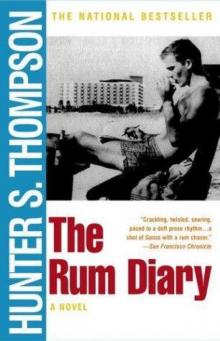 The Rum Diary
The Rum Diary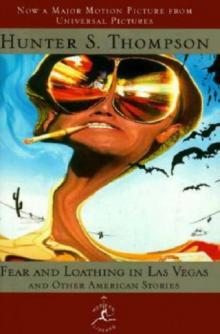 Fear and Loathing in Las Vegas and Other American Stories
Fear and Loathing in Las Vegas and Other American Stories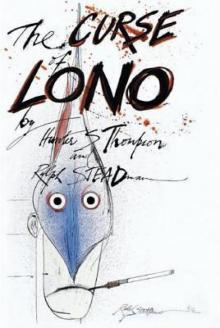 The Curse of Lono
The Curse of Lono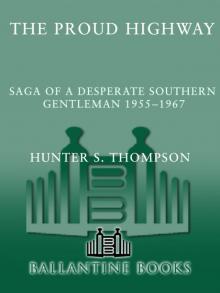 Proud Highway: Saga of a Desperate Southern Gentleman, 1955-1967
Proud Highway: Saga of a Desperate Southern Gentleman, 1955-1967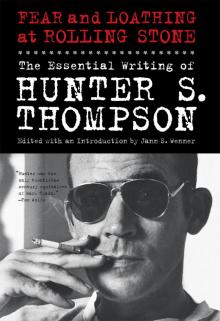 Fear and Loathing at Rolling Stone: The Essential Hunter S. Thompson
Fear and Loathing at Rolling Stone: The Essential Hunter S. Thompson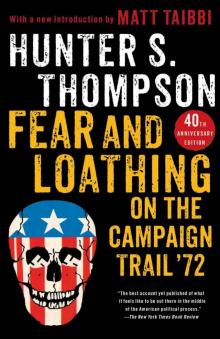 Fear and Loathing on the Campaign Trail '72
Fear and Loathing on the Campaign Trail '72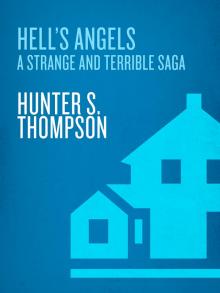 Hell's Angels: A Strange and Terrible Saga
Hell's Angels: A Strange and Terrible Saga The Great Shark Hunt: Strange Tales From a Strange Time
The Great Shark Hunt: Strange Tales From a Strange Time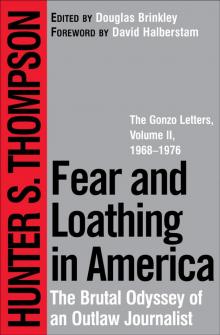 Fear and Loathing in America
Fear and Loathing in America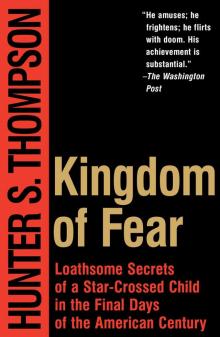 Kingdom of Fear
Kingdom of Fear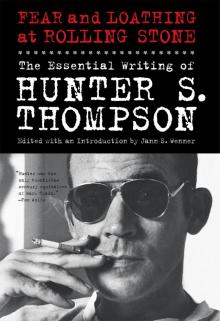 Fear and Loathing at Rolling Stone
Fear and Loathing at Rolling Stone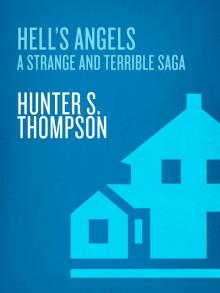 Hell's Angels
Hell's Angels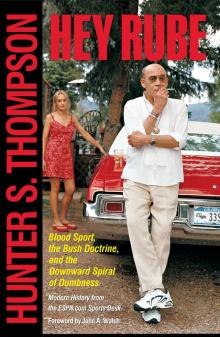 Hey Rube
Hey Rube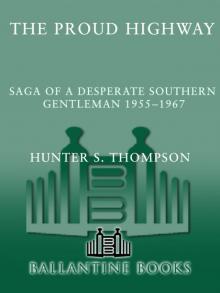 Proud Highway
Proud Highway